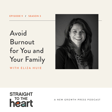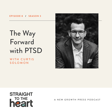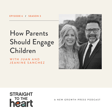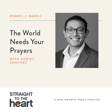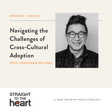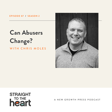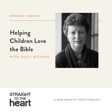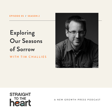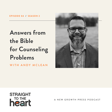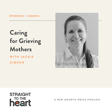Influence of Social Media on Teens
00:00:00
Speaker
Kids are talking to each other all day long. They go home, they get on social media, and they're influencing each other on social media all night long. And what you see is any loving authority, loving, wise authority, influence is being pushed out of their world because their world is all about their own peer group speaking in.
Introduction to 'Straight to the Heart' Podcast
00:00:19
Speaker
I'm Rush Witt, and you're listening to Season 3 of Straight to the Heart, a podcast from New Growth Press. Each episode includes thought-provoking conversations with leading Christian writers and thinkers. We hear who they are, what they believe, how they approach their work in ministry, and the moments in people who have changed their lives. In Straight to the Heart, we go beyond the books to connect with the remarkable people behind them.
Julie Lowe's Insights on Bullying and Social Media
00:00:44
Speaker
In this episode, I talk to Julie Lowe, a biblical counselor, speaker, and author. She's author of Childproof, Building Bridges, and Safeguards, as well as the many books, Helping Your Anxious Child, and Teens and Suicide. Julie and I discuss a topic she has worked through in depth, and one that is on the minds of parents, teachers, pastors, and anyone who cares about the souls of kids.
00:01:08
Speaker
She shares practical biblical wisdom for recognizing bullying, navigating the influences of social media in our digital world, and how we can bring the gospel to bear on this important issue. This is Straight to the Heart.
Understanding Bullying: Definition and Mislabeling
00:01:33
Speaker
So I know that obviously we're looking forward to work on this important topic of bullying and I'm just curious to hear how you would define what bullying is because I think it can be one of those terms like a number of things in
00:01:51
Speaker
in counseling and in daily life and struggles that we face that it becomes very important as it should be. But sometimes the more important that a topic becomes, it seems to me the harder it is to kind of pin down what exactly are we talking about when we think about bullying. And so I'm curious how you would answer that question because I think other people might ask that.
00:02:14
Speaker
Yeah, that is a great question. And I actually think it's such a great question because it is part of the problem with bullying today that labels and language get used all the time. And when we mislabel something, we mishandle it.
00:02:31
Speaker
So that goes both ways. If something isn't bullying, and we call it bullying, then we mishandle it. If something is bullying, but we avoid it and don't call it what it is, then we mishandle it. So we can mishandle it by labeling something, something that's not
00:02:50
Speaker
Which brings me to, well, then how do we know what bullying is? Is every act of mistreatment and unkindness, does it rise to that definition of bullying? And so that's been the challenge as well. I can define what bullying is, but we're also struggling to define what it's not.
Julie Lowe's Journey in Biblical Counseling
00:03:14
Speaker
What it is, is it's usually targeted, intentional mistreatment of another person that's repetitive or consistent. So there's usually the agenda to prey on somebody's vulnerabilities, whether those are perceived or real.
00:03:31
Speaker
So it could be somebody smaller and I'm picking on them. They're more shy. They're more timid But it's perceived vulnerabilities that we see in another person and we choose to exploit them or intimidate them Or manipulate them for that reason so you can hear even the language I'm using that would just be descriptive of it the challenge then is well what happens when a
00:03:56
Speaker
a friend says something that's really mean or manipulative or unkind, does that become a bullying behavior? So I think what you're looking for in the language of bullying is there's repetitiveness to it, a consistency to it, an intentional preying upon somebody's vulnerabilities, and then the language of coercion and manipulation.
00:04:20
Speaker
Yeah, that makes good sense. I think that's really helpful. I've really long appreciated your influence in particular, and through CCEF, my introduction to biblical counseling came about a little over
00:04:35
Speaker
maybe 20 years ago through seminary and was introduced to biblical counseling and CCF and really had a profound impact. And I'm just curious, I don't really know your story in history with biblical counseling and how biblical counseling took such a meaningful role in your life and ministry.
00:04:54
Speaker
Yeah, so I went to a Christian college for Christian counseling. It was a very integrationist approach. And I didn't really know the difference between the spectrum of counseling and biblical counseling at the time. But when I graduated from college, I very distinctly remember having this thought
00:05:17
Speaker
And the thought was, I know how to ask good questions, I know how to paraphrase, I know how to show empathy, but do I know how to apply the Bible to people's lives? And I just remember feeling that haunted question, how am I going to help people?
00:05:36
Speaker
It was almost like the Lord then used that to bridge. Within a summer, I went to a church where I met people that attended CCF courses and more biblical counselors. And I'm sure they saw me almost as somebody that needed to be proselytized and converted. And they did that. They did begin speaking to me about how the Bible does speak to every problem and every struggle and that there's a wisdom and a winsomeness in how you do it.
00:06:05
Speaker
Then they introduced me to CCF and that led me to come up to biblical seminary and go through their program at the time when CCF also taught their counseling program. So that was kind of my world into the biblical counseling world and just coming alive to see how scripture speaks to the struggles of human nature and suffering.
00:06:31
Speaker
Yeah, during that time of growth and training, what was going on in the rest of your life? You know, what stage were you in terms of family life and what else was going on?
00:06:41
Speaker
So I would have been in my 20s and single at the time and very much wanted to be in church ministry actually at the time. I really believe that ministry in the church and that's what biblical counseling taught but I was a young 20-something female who didn't have a lot of life experience yet and you know if I did people wouldn't presume I would.
00:07:04
Speaker
So the Lord brought me through my master's program. I had for a brief time worked in a Christian school doing counseling. I worked with Bethany Christian Services doing foster care social work. And the whole time I was doing part-time counseling. At the time Winston Smith was my mentor at CCEF through some of my program and he advocated for me to do counseling. So I was doing part-time counseling while working in other places.
00:07:32
Speaker
other prayer church organizations until eventually CCF began hiring me full time and then a position opened up as the director of student services. And I just slowly kind of evolved into my positions at CCF. So I almost talk about growing up. I kind of grew up in CCF in a lot of ways. Yeah. I wonder what at that time of use your evolution and biblical counseling, these opportunities coming along in growth.
00:08:03
Speaker
I've had some opportunities to encourage others in their own interest in counseling and some kind of like counseling supervision. And so I'm curious in those early stages, what were some of the, maybe one or two of the top
00:08:19
Speaker
areas that you found yourself growing in as you were learning about biblical counseling and kind of coming along and gaining case wisdom and having experience with counseling. What were some of the things that really stood out to your growth and helped you move forward?
00:08:36
Speaker
for sure being steeped in scripture and in rich theology and a mindset that says, God has something to say about this, but it also takes being willing to sit in it and think about it and
00:08:55
Speaker
kind of mind the riches of scriptures language David Pellison would use and actually that was probably the most profound thing too just having really wise people before me who I watched do it well and I thought that's what I want to be that's how I want to think and really pushing you to and sharpening both your thinking
00:09:16
Speaker
your people skills, your ability to observe what was happening, and then really learning that there's a work of the Spirit in there as well that helps you be wise and discerning to see and navigate things well.
00:09:32
Speaker
Yeah, you mentioned David Palleson. It just brings to mind for me one of the key ways that David Palleson helped me think about counseling was with the idea that I often feel that my Bible is too thin and I need my Bible to be thicker. I feel like that sometimes even this week.
00:09:53
Speaker
And so it's a good reminder for us to even think back about something you said a little bit earlier, which is at the heart of biblical counseling is knowing how does the Bible apply to the issues of life. And so I'd like to take a minute and talk some about how does the Bible speak to that topic of bullying.
Biblical Perspective on Bullying
00:10:15
Speaker
When you think about what the Bible says about it and how the Bible helps those who are not only experiencing bullying as a victim but are also exerting this control over other people, what are some of the keys that the Bible brings to this issue?
00:10:33
Speaker
The language of bullying, so you don't see bullying in the Bible, which makes us think, does scripture speak to it? But when you think of what is behind the bullying, the foolishness, the crude talk, cruelty and kindness mockery, that language isn't scripture. The intimidation or preying upon, the vulnerable or unassuming. That's all the language of scripture that says, don't let unwholesome talk come out of your mouth.
00:10:59
Speaker
Don't do things that corrupt others. Do things that only build each other up, not tearing each other down. Well, there it is, the foundation for how we live in relationships with others. And what bullying does is bullying reveals the way you shouldn't live in relationship with others. And scripture talks about the ways you shouldn't.
00:11:18
Speaker
cruelty and intimidation and mockery are all languages in the scripture how we're called to build up the weaker and to show justice to the weak and the fatherless and the destitute and the afflicted. So who are the weaker? Who are the afflicted? Who are those who can't stand up for themselves and were caught to intervene on their behalf?
00:11:42
Speaker
So there's even the bystanders brought in. So it's not just talking to the bullied or the one who is the bully, it's talking to the bystander that we're not called to sit back and be uninvested when we see harm happening to those around us. And then the language for those who are being bullied are that, you know, God sees the brokenhearted, he sees the suffering and how we're called, we call out for help and the Lord answers us and
00:12:11
Speaker
And even as parents, how we navigate helping our children know when to ask for help and when to stand up against injustices themselves. And it's all there. It's all in scripture. We just need to be willing to mine it.
00:12:28
Speaker
I want to take a moment and tell you about two of Julie's books. The first is a book called Safeguards, Shielding Our Homes and Equipping Our Kids. And the second is the mini book, Helping Your Child with a Bully. Because children are vulnerable, they need to be protected. After more than two decades as a family counselor, Julie Lowe has seen how important it is to help parents and caregivers think wisely and biblically about the dangers children face.
00:12:56
Speaker
Instead of living in fear or denial, parents and caregivers can equip children to assess people and situations and model for them how to live by faith in a world where evil exists. Safeguards provides tools, skills, and resources to help when faced with uncomfortable, challenging, or dangerous situations.
00:13:18
Speaker
Instead of growing more anxious, parents and caregivers can grow in a biblical understanding of the type of dangers and issues children and young people might face. They can learn how to instill confidence and conviction in responding to new or fearful situations and distinguish between safe and unsafe people and situations.
00:13:38
Speaker
This is what safeguards is all about, but I also want you to know about the very short resource titled helping your child with a bully. It's a mini book where Julie offers tips for discerning the nature of the bullying behavior and gives practical advice for the best ways to respond and points parents to the wisdom from God that comes as we ask him for guidance and help. Just as Julie describes in this episode, she encourages parents to start by being a source of comfort and understanding.
00:14:08
Speaker
Helping a child identify safe people to go to and role-playing appropriate responses to mean behavior. Reminding children that their value comes from Jesus and that he's always with them will help counteract the temptation for retribution or mishandling of conflicts or falling into isolation. You can find both of these helpful resources on our website, NewGrowthPress.com.
00:14:36
Speaker
Your practice of biblical counseling, I think, has taken you into opportunities of ministry in a number of different contexts, whether it's in a counseling room or in a school context or among families. And I'm curious kind of how you see those different areas as being similar or different.
00:14:56
Speaker
especially as it comes to this issue of bullying, because bullying can happen in these places. And I wonder how you see the ways that you might address it in a different context, because there are people from different contexts who are listening to our conversation today and thinking about it where they are.
00:15:15
Speaker
Yeah, well, we used to think of bullying primarily happening in schools, right? So it's the schoolyard bully, the lunchroom bully, we have that picture of the big intimidating child on the little child. But what's more disturbing, why it crosses out of the spectrum of just in the school context is when technology entered in and social media entered in.
00:15:39
Speaker
And what I'd argue kids used to be the primary place bullying had to be addressed was in the school or parents working with the school now has moved into the public sphere because we know that anything you put out there on social media is both public and becomes permanent.
00:15:57
Speaker
And so at least a child used to be able to leave school and get away from the bully for a season, but now that bullying behavior turns into cyberbullying. It goes with that young person, with that teenager in ways they feel they can't escape it, in ways their life feels completely marred by it. And it has a much more damaging effect because of the tools in which bullying can occur now.
00:16:25
Speaker
So it certainly happens in the church context and youth groups. It happens out there somewhere in the cyber world where it crosses every avenue of life, family, church, home, school. So it becomes a much bigger deal because of the venue in which it exists.
00:16:46
Speaker
Yeah, I think that really is true about social media and the influence
Managing Social Media's Impact on Teen Mental Health
00:16:50
Speaker
there. It's a question that comes up a lot among our friends in our church is what should parents be doing with social media in particular because of this? You know, obviously there's screen time issues, there's time management, there's
00:17:02
Speaker
interference with how kids are going to do in school. But when it comes to this serious issue of bullying, cyber bullying, I'm curious, when you minister to families, parents, counsel them, what is your typical advice to them on how they should be thinking about social media with their kids, how they should be monitoring or controlling it, and what you typically say to them? Yeah.
00:17:34
Speaker
Social media, I'll start with that. Social media, I would argue that parents should keep their kids off of social media for as long as possible. Why do I say that? It's not because I'm anti-social media or technology. You just look at the research and the research demonstrates that kids on social media are more anxious, more depressed, less happy, more addicted, more fixated, less content.
00:18:03
Speaker
like I can go on with adjective after adjective and that's the research so it's not my opinion or my perspective it's just true that social media breeds comparison it breeds a discontentment probably in all of us or picking on the poor teenage level but it's really true I think across the board it doesn't have to be that way but it tends to be that way
00:18:28
Speaker
Technology is a gift, it's a tool, and it's how we use it that really decides if it's detrimental or not. I could argue the same with social media, but it's just so much harder for young people because it breeds a culture of speaking into teens' life. It's peer-on-peer wisdom.
00:18:47
Speaker
And not a lot of good sound advice comes out of young people So they it becomes a very insular world where kids are talking to each other all day long They go home they get on social media and they're influencing each other on social media all night long And what you see is any loving authority Loving wise authority influence is being pushed out of their world because their world is all about their own peer group speaking in so
00:19:16
Speaker
It speaks to the hard, the difficulty of saying, yeah, social media is great or social media can be good, which I believe for sure it can be, but it also prevents loving, solid influences from ending into a child's life. So for that reason, I'd argue, keep your kids off of social media for as long as possible.
00:19:37
Speaker
teach them the stewardship principles of both technology and social media, and then you have to be proactive. You cannot be reactive. Proactive means I need to be on the same accounts my kids are. Proactive means I need to see what they're seeing. Proactive doesn't mean I'm controlling helicopter parent
00:19:56
Speaker
proactive means I understand the gravity of not being involved, of not being up to speed. And things change so fast that as adults we struggle to keep up with what teens are learning and doing and what social medias are adapting to. But if I'm a parent,
00:20:13
Speaker
Or if I'm working with kids, I've got to make it a priority to know what they're on. It's just so important. A connected question on which I'd love to hear your wisdom is similar to what you've just answered about kids, but about parents and adults, because we see, you know, as adults, we're not immune to the pressures and challenges of social media, the pull of
00:20:38
Speaker
of the time that we can spend or as a really big part of what has become entertainment in our society, and yet it carries similar kinds of dangers and difficulties and struggles. Some of that's, I think, seen because I've done this and I have friends that I see on social media who will take these breaks.
00:20:59
Speaker
suddenly they will say, I'm going to be off social media for a while. And that's just one of those evidence, you know, something's not going right. And there's this sense, I need to step away from this, but we all tend to come back to it again. And so I'm just curious what your wisdom is for adults as well. And maybe even particularly parents, because they're encouraging their children in the area of social media. And yet also, you know, finding their own way to use it as a tool, um,
00:21:28
Speaker
and in proper ways. What do you think about that? Yeah, I think social media to connect to relationships, especially I think of missionaries on the field or families living across the country or in different time zones. There's so many ways that you could see the benefits. I have a son with a vision disability and
00:21:50
Speaker
to be on social media with other families who experience the same thing creates a community in all the best of ways. It runs them up really quickly too if we're not careful. So it can be commiserating together. It can be negativity. It can be bad ideas or advice being given.
00:22:14
Speaker
on the adult level or the child level. We find that true of all of us. So it's where's my source of wisdom and help? Where's my source of community? When is it a good thing that it's my source of community? When does it prevent me from real community? So I see
00:22:31
Speaker
We all do this. We will be standing in line. And if we're standing in line for more than three seconds, we're pulling our phones out because we're bored and we need something to keep us busy instead of learning not to be bored or learning to be bored. Why is it so bad to sit for five minutes in the Chick-fil-A line and be bored?
00:22:50
Speaker
Or to be observing the world around you or to have to talk chit chat with somebody in front of you or behind you and I'm an introvert at heart I'm not a chit chatty talk to my next-door neighbor kind of person but to stand there and actually just live in that or we hear stories all the time of being in a concert and you are there experiencing the concert but you're having your phone up and putting it up instead or you're on your phone like and
00:23:14
Speaker
It changes relationships. It changes community in ways that are potential harm. And we as adults do this all the time. We tell our kids, if you guys have to be off your cell phones for a meal, we have to be off our cell phones for a meal. And we can go to a restaurant and we'll all look around and we'll
00:23:32
Speaker
Challenge each other to find a table that doesn't have a cell phone out on the table or somebody on it So you see it just changes Communication it changes relationships And that doesn't like I said, I'll keep saying it doesn't have to be for bad, but it does we do see the dark side of it
00:23:52
Speaker
It really is an incredible shift in our society and culture. I heard some social commentators, I suppose you would call them, just pointing out the way that devices like my iPhone have become part of almost an extension of our bodies. And we have those kind of, you know, wild conversations and expectations in the future of there will be this chip in your brain and your phone will be, but for something, yeah.
00:24:21
Speaker
But even now, we have these things on our wrists, we have them in our hands, they become part of the way we think about and see life. That's a profound picture that you gave a second ago in terms of being at a concert or a sporting event. And instead of watching it live with my eyes, I'm going to watch it through my screen, even though it's happening right across the room from me.
00:24:46
Speaker
You got the real deal in front of you, but you're putting up a screw. Yeah. And this feeling that I need to capture it on my device for it to be mine or for it to be memorable. So everyone has a copy of the same thing happening on their device. It really is an interesting shift of the way that we think about life and
00:25:10
Speaker
No, it's just, yeah, you're right. We experience, instead of just experiencing life, it's like we have to record our experiences of a life. And I'm sure there are ways that we record things for posterity state, but instead we're vicariously living, excuse me, we're vicariously living, I think, through posting it or our experiences. People need to know our experiences rather than we just, we just steep ourselves in the experiences of life. Every family is unique.
00:25:40
Speaker
which is why Childproof explores the need for parents to cultivate personal and intimate care for their children as modeled in God's individual, personal, and fatherly care to His children. This child-rearing book lays a foundation of parenting by faith and progresses by teaching readers how they can know their own kids well and raise them accordingly.
00:26:04
Speaker
By discussing particular issues moms and dads might have in family life, Julie demonstrates how formulas aren't the answer and parenting with biblical wisdom is best for a proactive rather than reactive approach to parenting. By establishing a mindset rather than a model or a step-by-step how to approach to parenting,
00:26:28
Speaker
Childproof empowers readers to come up with their own blueprint for their families through a biblical framework. So take a moment soon to visit NewGrowthPress.com and learn more about Julie Lowe's book, Childproof, parenting by faith, not formula. And now back to my conversation with Julie Lowe.
00:26:50
Speaker
I wanted to ask you some more about helping parents because I know as a parent myself that parents are often afraid because they know there's a lot they don't know. That they can't be with their children all the time. They can't monitor everything. And it seems like devices and social media set up another context where there's a shadow. I don't know exactly what's going on.
00:27:16
Speaker
And so it can be hard for parents to know how then in that unknowing can I discern when bullying is an issue in my child's life. And so I wonder if there are some common evidences that you see in kids that you are counseling or helping and how parents might identify that in a world where there's a lot that we can't see.
00:27:47
Speaker
When our children start changing their behavior, that's usually a key signal. So some kids can become more outgoing, some can become more reserved. Our tendency is they withdraw from things, they stop wanting to show up at school events or go to soccer practices, things like that, things that were normal, things that brought delight and enjoyment, they begin refraining from.
00:28:12
Speaker
And again, with the cyber bullying, there doesn't leave marks and bruises or doesn't leave, you know, lunch money that was stolen. Rather, that's the danger of that, that there can be this whole world of what your child's experiencing and you're utterly oblivious to it if you're not connected to your child. And I think that's really the key that I can't know everything that's happening in my child's world, but I can know how to draw my child out.
00:28:40
Speaker
I can say I want to be an expert at knowing my kids so that when something's amiss, I might not know what, but I'm noticing. And that leads me to start probing and asking good questions and pursuing them more and paying attention more. So noticing knowing my child well, noticing when things are different for them. And then the other thing is I just pursue open-ended questions. Tell me about your day. Tell me what went well.
00:29:09
Speaker
tell me what 10th graders are doing in school these days. And so why they might be reserved to tell me about themselves, they're usually very open to telling me what all the other kids are doing or the trouble they're getting into or the bad things that kids are doing. And then I know what my kids are being exposed to. And I can say, hey, are you ever tempted to make fun of that kid too? Does that make you want to join in? Do you ever feel guilty about that?
00:29:38
Speaker
So I never want to think of my child being the bully. I often want to fear that they may be bullied. But we also have to realize that that that peer pressure to joke and make fun of other people exists too. And so even acknowledging that to my children and saying, when you're tempted to step in, what are things you can do instead? Or I understand the temptation because you want to fit into that peer group and it might be easier to laugh at this child.
00:30:03
Speaker
What does that say when you do that? And we're just having these natural conversations where they're not lectured, but it's a platform for teaching and discipling them.
00:30:14
Speaker
Everything that you're saying is immensely helpful and it's really helpful to me. It's one of the reasons I love these conversations and being a part of this podcast as I'm learning and growing as a parent. And one question that I think a lot of parents ask is in an issue like bullying and these interpersonal challenges that our kids face and we want them to grow up, we want them to gain their own maturity of handling this, but it can be unclear of
00:30:42
Speaker
When should I encourage them to handle this issue or to take a certain step of peacemaking with this other kid or someone at school or something like that on social media? And so I'm curious what you advise parents, how you advise parents to think about that.
00:31:02
Speaker
Yeah, the place I always start is I'm going to lean into wanting to equip my child. And so equipping them means they're going to come across difficult people, angry people, harsh people, even dangerous people.
00:31:16
Speaker
I want to equip them to know how to handle those situations. And so my first line is to say, everything's going to be a teaching moment. Everything's going to be, all right, buddy, what would you do in this situation before they even get in the situation? So they feel they have the resources. They feel they can discern when do I, when do I stand up to this kid and when do I go get help? And you're helping them think that through. When,
00:31:42
Speaker
When do you say the right thing and you stand up to a bully and when does something cross the line where now you say, actually, adults need to be involved? When is it a safety issue? When is it a moral legal issue? When is it a dangerous issue? So I'm giving categories like that to say, when can you and should you handle it yourself and not go running to somebody else for help? When is help not only necessary, but it's the wise thing, the mature thing to do?
00:32:12
Speaker
And then as a parent, you know, when do you need me to step in? Because I always want to be willing to step in on your behalf, but neither do I want to just be risking you from hard things. I'm going to teach you to go through the hard things, to know you're not alone, to know the Lord's with you, and He's equipping you to go through the hard things.
00:32:31
Speaker
But when children are being mistreated and weaknesses and vulnerabilities are being exploited, then the right thing to do is to have somebody to step in on their behalf. And I also want to raise my kids to be people that step in on somebody's behalf when they see that somebody's too weak or too fearful to do that.
00:32:49
Speaker
The question of seeking help is super important, and it makes me think about how parents, especially in this kind of topic, can feel alone and can feel like this is an issue happening in my home, but there isn't a lot of support outside.
Church's Role in Supporting Bullied Children
00:33:10
Speaker
And of course, we know, though, even when we say that, we know that the local church community
00:33:15
Speaker
is an important part of all of these issues of soul care. And so what advice do you have for families and perhaps even churches in terms of how they can be a part of help, bringing help when help is needed? Well, intervening
00:33:37
Speaker
What does intervening look like? There lies the question. When you intervene, does intervening just mean we come alongside a child that's not easily accepted by their peer group? We're going to come alongside them and we're going to be in their peer group. We're going to support them. We're going to give them meaning and value. We're going to let them know that their peer group doesn't have the last say, that value is found really in identity in Christ. And that's so abstract.
00:34:04
Speaker
for children that we have to make it street level for them. Your value is not in your appearance, your value is not in your size, your value is not in what these people say about you. God says you have value and you have worth beyond measure. And we're pouring those words of truth and hope into a child's life. There's nothing more important that's gonna help them rise up against mistreatment and bullying.
00:34:31
Speaker
Then the question is, when is it safety? When is it their vulnerabilities, weaknesses, whether it's a disability or size or manipulation, when is it really being manipulated in ways they need somebody to intervene on their behalf and they need safety? And we always need to be willing both to speak to the bully, to speak to the family, to step in and offer precautions or boundaries
00:34:59
Speaker
that's happening in contexts that we can set up safety. We can move kids out of a class or say not on church grounds, whatever those things may be. When it happens out in social media, it becomes really hard. And that's where parents and adults have to band together and getting people off of social media that are mistreating and devaluing people and there's the pressure to get them off.
00:35:26
Speaker
Sometimes it's saying to my child, honey, you need to be off social media or technology for a while because you don't need to be exposed to this. This is hurting you. And I banned them from being on or they take their break from social media. When do authorities need to get involved? Again, it's issues of when there's sexting or pornography or inappropriate pictures or cruelty that's happening. There's a level of online
00:35:54
Speaker
Behavior that rises to criminal level and when do we need to say it's time to get that involved? So I kind of think of it as you have the Matthew 18 principle where you go You work as privately as possible and go as public as necessary And so I think of that with bullying. I want to quit my child. Do they have the resources that they can stand up to this? I
00:36:18
Speaker
And I want to help them learn how to do that until it needs to be more and more public and there needs to be more and more intervention. So I think in similar ways, I do it as one on one as possible and then make it as public or bring as many resources or adults in as needed because it's risen to that level.
00:36:40
Speaker
When you think of parents or pastors or other church leaders who are on just the front edge of addressing this issue, are there particular passages of scripture that you think are uniquely helpful at that front edge right where they're just trying to get going and they're trying to give the appropriate
00:37:02
Speaker
maybe word to their child or a student. And then maybe a second part to that question would be, how do you encourage them to look to the gospel as a central source of hope and help for the issue of bullying?
Hope and Guidance from the Gospel
00:37:18
Speaker
Well, some of the easier things are Psalms, I think it's Psalms 82, but a lot of the Psalms talk about giving justice to the weak and helping the afflicted rescue the weak and needy. So there's a model for the church, a model for the bystander, a model for everybody to say, we don't passively sit back when injustices and mistreatment are happening. We enter in.
00:37:43
Speaker
and we discern what justice looks like. So it's twofold. We enter in. There's the clear calling. Scripture is telling us, enter in. Now the wisdom is, what do we do when we enter in? What's the need to meet? And so, you know, what's the language of Scripture that we're reminded to help those who are afflicted and weak, that it's good and right to teach our kids to notice.
00:38:08
Speaker
and to handle that. We also see that we're called to equip our children to give them what they need to navigate the perils of this world. Therefore, the church at large needs to do that. We want to help those who are vulnerable, we want to be protective, and we also want to strengthen them and equip them to navigate those things.
00:38:29
Speaker
Then we want to create cultures. We want to be a culture community that is safe and models that we talk about these things and we do what is right. We seek what is right and just. How do you encourage parents and Christians in general who want to have a unique Christian approach to this topic to see the gospel as central to the issue of bullying?
00:38:55
Speaker
Yeah, well, I think of just our model in Christ that we have a high priest who sympathizes with our weaknesses, that he was mistreated and reviled, that he was spit upon and rejected, that he understands. And that's so core to the gospel that we have somebody who entered into our humanity to understand our sufferings, and we're not alone in it.
00:39:20
Speaker
So first we have somebody who understands, who lived it and entered in, and we breathe life into that reality. And then the second is, he is with us. Like over and over again in scripture, the answer to our sufferings is we're not alone, he is with us.
00:39:37
Speaker
and that He won't waste our suffering, that He's up to something good, that He is good and He's up to something good. And so I don't have to say my suffering is good, but I can say God is good and He's not going to waste my suffering and there's the hope. And then we also know that the Lord says that He'll maintain the cause of the afflicted and that He will bring justice to the needy.
00:40:04
Speaker
that a broken reed, God doesn't despise. And so you have all this language that God doesn't leave us in hard places, that He will do something, He will come, that He's a very present help in time of trouble. And that Gospel is just infused with both that hope, that message you're not alone, that somebody has gone before you, that they've experienced that, and that He gives us a way out.
00:40:26
Speaker
And that's the message of the gospel. It's a message of biblical counseling that hope resides in a person who is with us and guiding us.
Podcast Engagement and Conclusion
00:40:38
Speaker
Thank you for listening to this episode of Straight to the Heart. Would you do me a favor? If you enjoyed this episode, would you rate the podcast? It helps us reach more listeners. It doesn't matter where you listen. Spotify, Apple Podcasts, YouTube, wherever. Rating and liking the podcast helps.
00:40:56
Speaker
And if you'd like to learn more about past seasons of our podcast, you can visit newgrowthpress.com forward slash podcast. Our next episode will appear next week, wherever you get your podcasts.



